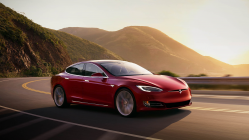— A Tesla unintended acceleration lawsuit didn't convince a federal judge the claims shouldn't be sent to arbitration between each customer and Tesla.
According to the lawsuit, Tesla's vehicles contain defects that cause sudden unintended acceleration that has caused crashes and injuries.
The plaintiffs allege Tesla manufactured the vehicles to make them appear a driver pushed the accelerator pedal which caused the sudden acceleration, concealing defects in the vehicles.
While the plaintiffs claim the vehicles have defects, none of the plaintiffs say they know what those defects are because Tesla conceals the workings of the vehicles.
The lawsuit references complaints and instances of crashes and injuries allegedly caused by the vehicles accelerating without driver input. In many cases the vehicles are less than a year old, and in all cases the automaker blames the driver for the alleged problems.
Tesla argues the vehicles can accelerate from zero to 60 mph in less than three seconds, and data recovered from the vehicles allegedly show drivers made mistakes and hit the accelerator pedals instead of the brake pedals.
However, the lawsuit alleges data indicate those results exist because Tesla committed a computerized cover-up.
Tesla Unintended Acceleration Claims Sent to Arbitration
Each plaintiff signed an order agreement, retail installment contract or leasing agreement with Tesla. The relevant agreements to arbitrate appeared in one or more agreements with these terms.
“You agree that any dispute arising out of or relating to any aspect of the relationship between you and Tesla will not be decided by a judge or jury but instead by a single arbitrator in an arbitration administered by the American Arbitration Association (AAA) under its Consumer Arbitration Rules.” - Tesla agreement
Each arbitration agreement also contained a 30-day opt-out period, and each agreement specifically said:
"In other words, you and Tesla may bring claims against the other only in your or its individual capacity and not as a plaintiff or class member in any class or representative action.”
In its motion to dismiss, Tesla says all the lawsuit claims should be sent to arbitration based on the "procedurally conscionable" agreement which includes an opt-out clause.
The judge agreed and said the "presence of an opt out clause within the arbitration agreement renders the agreement procedurally conscionable and not oppressive."
At the end of the order agreement and in order to finalize and place the order for their Tesla vehicle, the screen advises the buyer that by placing the order and clicking the button, they agree to the order agreement which then links to an online copy.
According to the judge, there was no element of surprise or oppression when the customers agreed to the arbitration agreements.
The Tesla unintended acceleration lawsuit was filed in the U.S. District Court for the Central District of California: Lee, et al., v. Tesla, Inc. et al.
The plaintiffs are represented by McCune Wright Arevalo, and Bailey Glasser.

